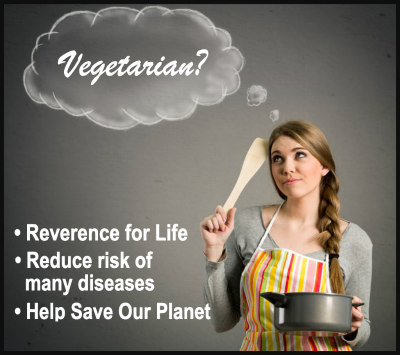Earth Etude for Elul 27 — A Vegetarian Journey

by Susan Levine
~ When I think about Elul, I think about things I have done over my lifetime and the most important thing I’ve tried to do is to become a vegetarian.
But let me start at the beginning: Both my parents grew up in kosher homes and when they got married, they had a kosher home. But it wasn’t kosher enough for my father’s mother who would visit my parents but wouldn’t touch the food. My mom didn’t see the point of being kosher if her mother-in-law still wouldn’t eat in her home. Instead she went full treif. As a child I pretty much ate what I wanted and really didn’t know what it meant to be kosher. I remember one Friday in fifth grade when I packed a ham-and-cheese sandwich for lunch and my friend Kelly, who was Catholic chastised me for eating meat on a Friday since at that time many Catholics ate fish instead of meat on Fridays. I took another bite of my ham and cheese and laughed, “Kelly, I’m Jewish.”
My Jewish education consisted of going to an occasional family seder and getting a present on Chanukah. We didn’t belong to a synagogue, but I had a lot of Jewish friends and sometimes we would make cameo appearances at the Reform synagogue on Rosh Hashanah. When my husband and I met it seemed like we were from two different cultures. His parents were Holocaust survivors who spoke Yiddish as their first language. They belonged to a synagogue and kept a kosher home. In fact, keeping a kosher home was a condition that I had to accept to get married. I had a lot to learn, and I had to give up one of my favorite foods, shrimp. I started cooking kosher and gained weight as people often do after their weddings. By our second anniversary, I couldn’t fit into any of my clothes.
Something had to change. I started eating more salads and less junk food and took a yoga class. At the end of each class we were flat on our mats with our eyes closed while the teacher spoke about reverence for life and not eating animals. But I wanted to know: What did Judaism teach about not eating animals? I read Richard Schwartz’s book, “Judaism and Vegetarianism”[1] and I was surprised to learn that from the time of Adam and Eve, people were supposed to be vegetarians (Gen.1:29). And it wasn’t until after the flood that people were given permission to eat meat (Gen. 9:3). I chose to become a vegetarian and I asked my husband if he’d join me. We’ve been vegetarians — and living at healthy weights — ever since.
I admit that I haven’t been a perfect vegetarian. While I haven’t cheated with shrimp, every now and then I have eaten some salmon or other kosher fish. Just a few weeks ago I ate a trout for dinner. But a bone caught in my throat, reminding me that fish are living creatures. One of my goals for 5780 is not to eat fish anymore. And now I know that the Jewish thing isn’t simply to refrain from eating ham, but to refrain from killing and eating all of our fellow animals.
Research has shown that vegetarian and vegan diets reduce the risk of heart disease, diabetes, hypertension and some forms of cancer. I also can help save the planet since vegetarian diets use far fewer natural resources and produce far fewer greenhouse gases than diets that include meat.2
- Schwartz, RH. 3rd ed. New York, NY: Lantern Books, 2001. (1st edition: Smithtown, NY: Exposition Press, 1982.)
- Melina V, Craig W, Levin S. “Position of the Academy of Nutrition and Dietetics: Vegetarian Diets.” Journal of the Academy of Nutrition and Dietetics. 2016; 116 (12): 1970-1980.
Susan Levine is the volunteer and intern coordinator and social media coordinator for Aytzim: Ecological Judaism. She holds a master’s degree in education.

Got something to say?
You must be logged in to post a comment.